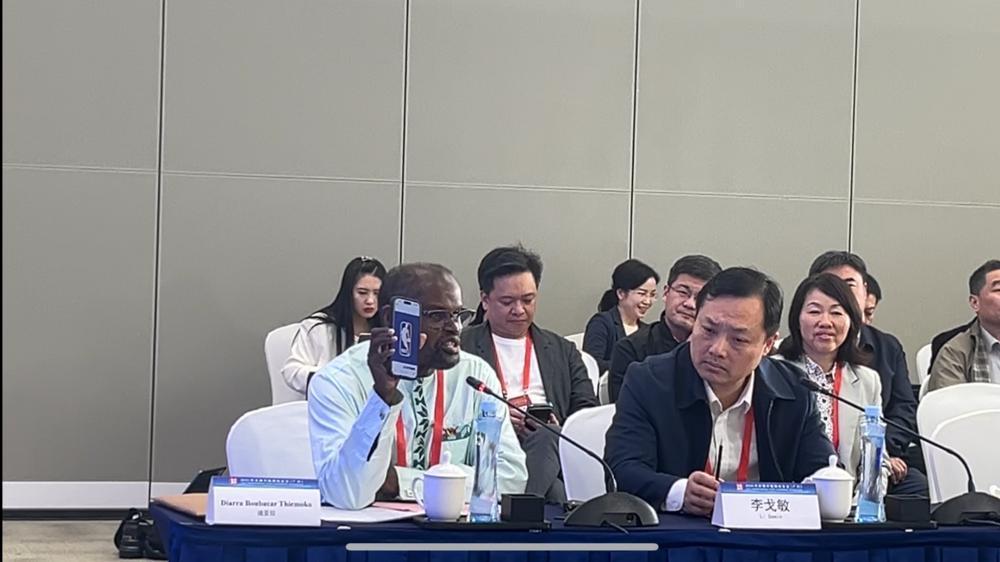
At the 2024 Understanding China Conference (Guangzhou), Dr. Diarra, an African Traditional Chinese Medicine (TCM) practitioner from the Republic of Mali, received a standing ovation. Having lived in China for over 30 years, he is currently the Vice Chairman of the Chinese-African People's Friendship Association. Before speaking, he deeply bowed and, with a smile, said in fluent Mandarin: "If you understand my bow, you will understand traditional Chinese culture. If you understand Chinese medicine, you will understand China."

In 1986, Dr. Diarra arrived in Guangzhou to pursue his undergraduate and master's degrees, and in the 1990s, he earned a PhD in Chengdu. During the conference of "Modernization, Internationalization of Traditional Chinese Medicine, and High-Quality Development of Global Health and Wellness", he shared his insights on the global expansion of Chinese medicine. Today, Chinese medicine is gaining worldwide popularity, and Africa has seen a "Chinese medicine boom." In Mali, for example, many hospitals have started offering TCM services. When Dr. Diarra returns to his home country for free medical consultations, he is often surrounded by patients. He has even used TCM techniques, such as acupressure massage, to help patients with leg cramps regain the ability to walk.
The popularity of TCM in Africa can be attributed to two main factors. First, policy support, particularly the Belt and Road Initiative, which has strengthened medical cooperation between China and Africa. Second, TCM shares similarities with traditional African medicine, as both primarily use plant-based treatments and employ similar practices, such as massage and cupping. As a result, the prospects for the spread of Chinese medicine in Africa are very promising.
Regarding the global expansion of TCM, Dr. Diarra highlighted five key factors: branding, culture, talent, product, and market. Using mobile phone brands as an example, he emphasized that TCM should also develop a distinctive brand culture to showcase "Made in China." He also pointed out that TCM is a precious part of Chinese traditional culture and a "key" to unlocking Chinese civilization. Learning TCM helps one "understand China." However, he stressed that the challenge lies in how to pass this "key" to foreigners, teach them the correct way to use it, and create conditions for its global promotion-issues that need urgent attention for the international spread of TCM.
Source :Lingnan on the Cloud
“读懂中国”来了位非洲中医,他讲了啥让现场掌声不断?
在2024年“读懂中国”国际会议(广州)的专题会议上,来自马里共和国的非洲中医迪亚拉赢得掌声。他已在中国生活30多年,现任中非友好协会联盟副主席。他在发言前深深鞠了一躬,用一口流利的普通话笑着说:“如果你读懂了我的鞠躬,就读懂了中国传统文化,如果你读懂了中医,就读懂了中国。”
1986年,迪亚拉来到广州攻读本科与硕士,90年代又在成都取得博士学位。在“中医药现代化国际化与全球卫生健康事业高质量发展”专题会议中,他分享了中医药国际化的见解。如今,中医药文化在全球升温,非洲出现“中医热”,如在马里,许多医院已开展中医药诊疗服务,他回国义诊时总是被患者簇拥,曾用中医按摩点穴帮腿脚抽筋患者恢复行走。
非洲中医受青睐,一是因政策支持,共建“一带一路”使中非医疗合作加强;二是中医与非洲传统医药相近,都以植物用药为主,推拿、拔罐等方法相通,所以中医在非洲传播前景广阔。
对于中医药文化“出海”,迪亚拉提出品牌、文化、人才、产品、市场这5个关键要素,以手机品牌为例,强调中医药也需打造特色品牌文化,彰显“made in China”。他还指出,中医是中国传统文化瑰宝与打开中华文明的“钥匙”,学习中医有助于“读懂中国”,但如何将这把“钥匙”传递给外国人,以及传授正确使用方式、创造传播条件,是中医药文化“出海”亟待思考的问题。
文、图|记者 郭思琦
译|林佳岱
审|赵凡
-
A wheelchair dancer in a Mamianqun
2024-12-04 23:18:10 -
Poster丨Understanding China through the Guangzhou Night Event
2024-12-04 21:23:39 -
CCVlog|Understanding China Through Cartoons 在漫画里读懂中国
2024-12-04 21:01:16 -
Ylog|Keywords of Chinese Modernization in Their Eyes 外宾眼中的中国式现代化关键词
2024-12-04 10:20:34






